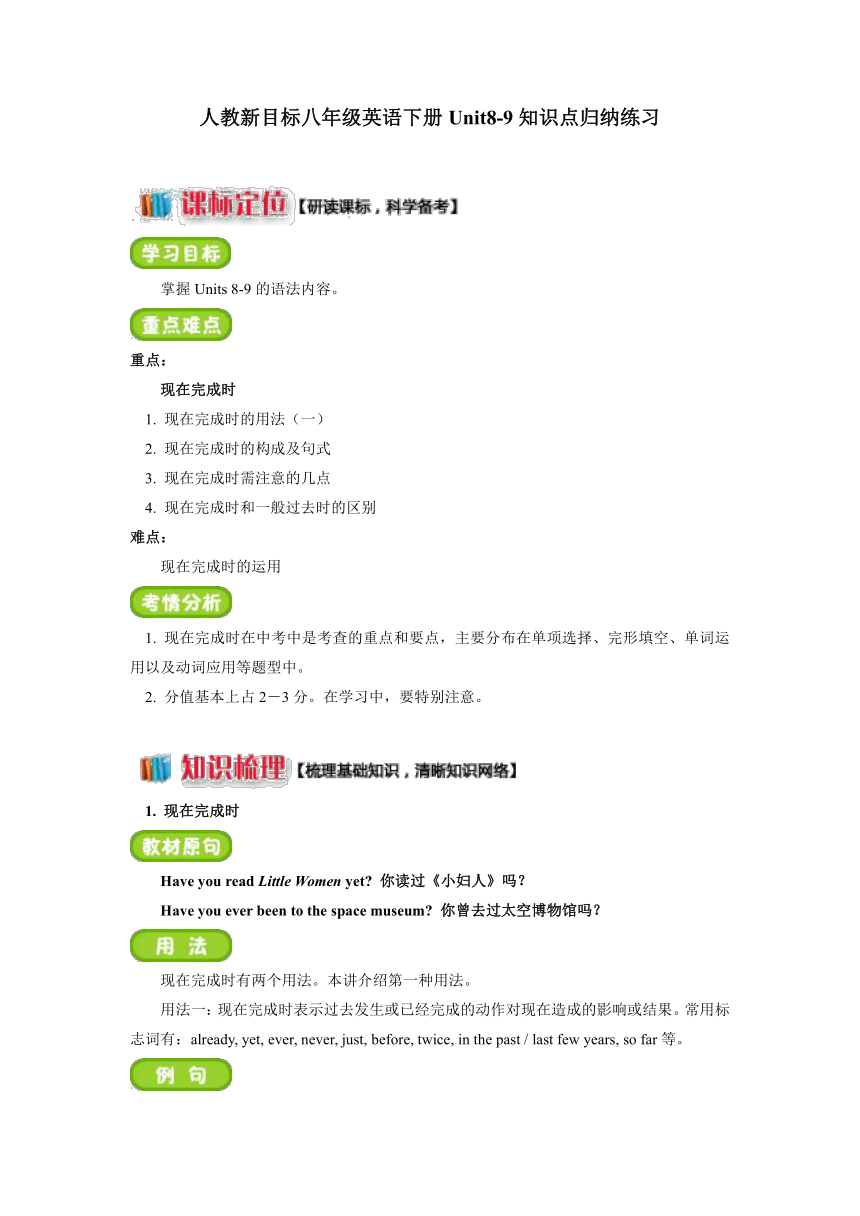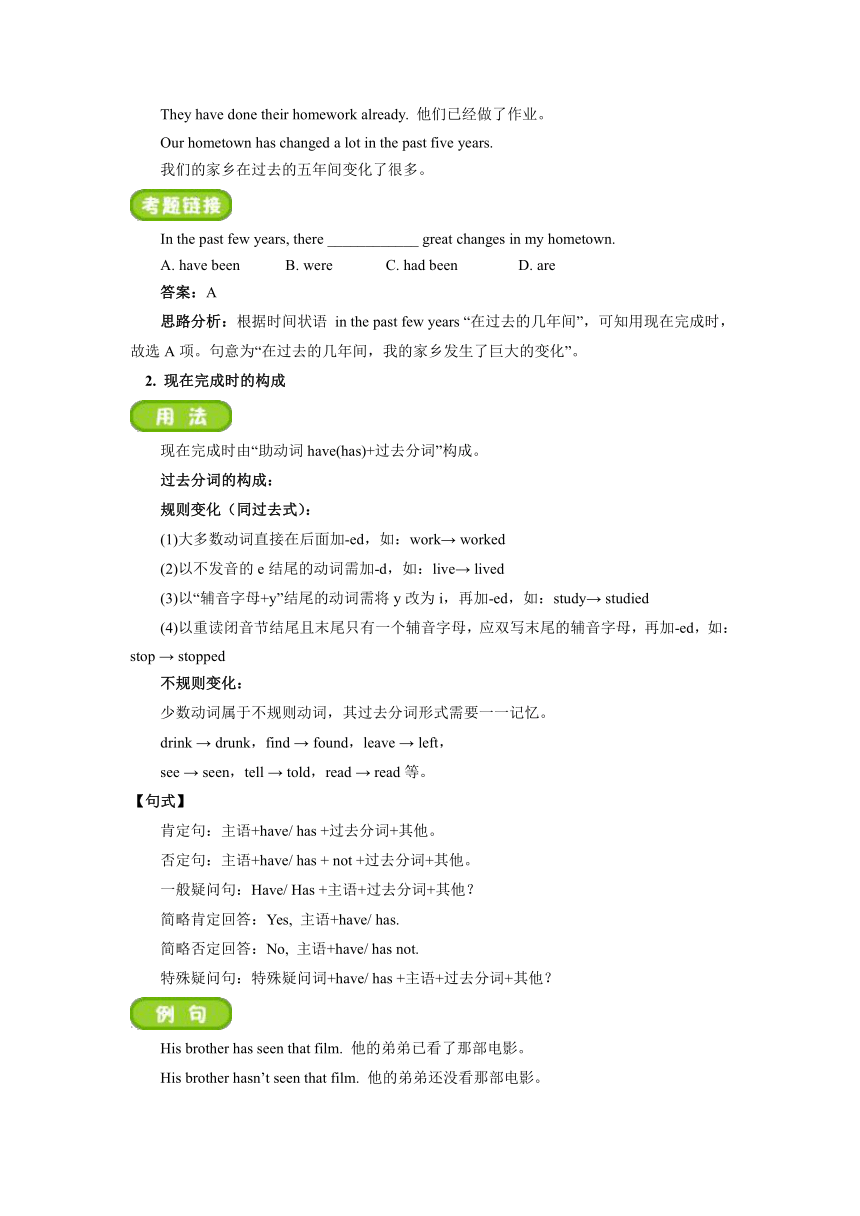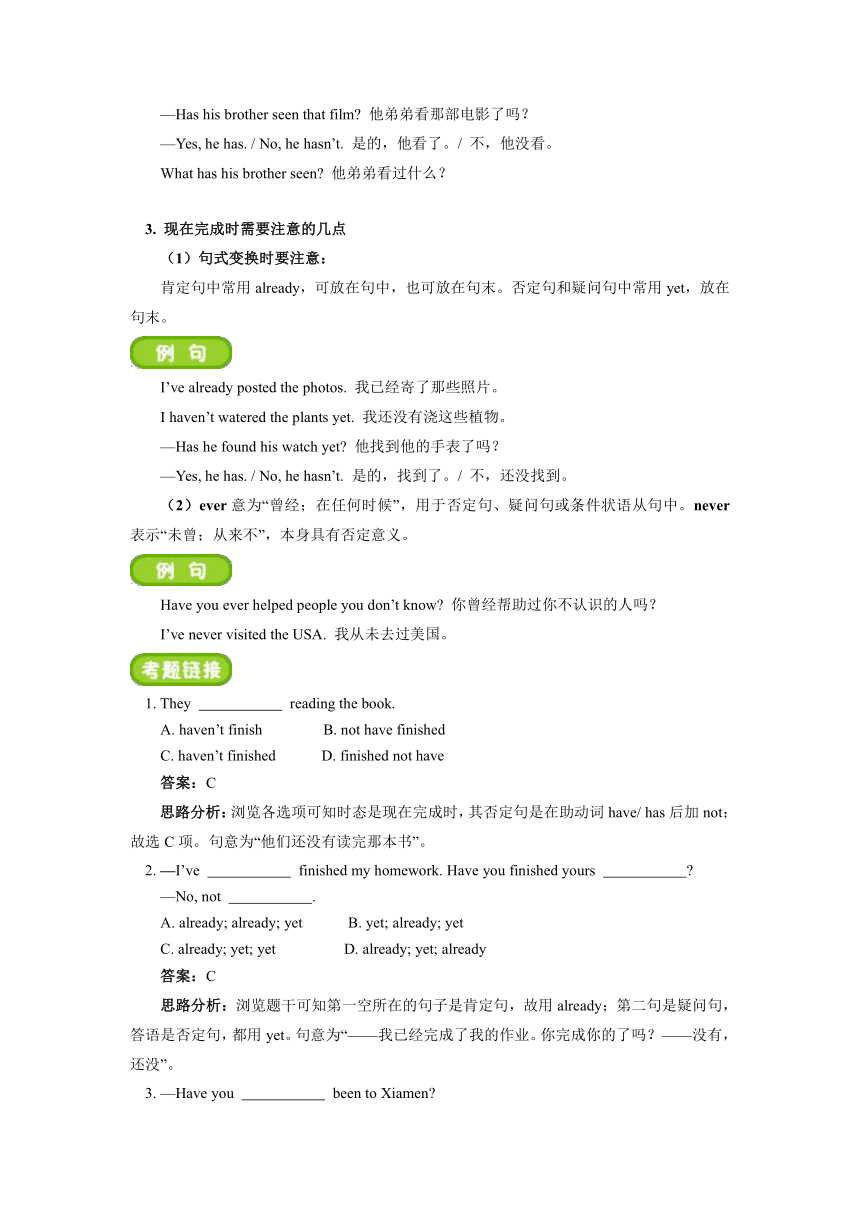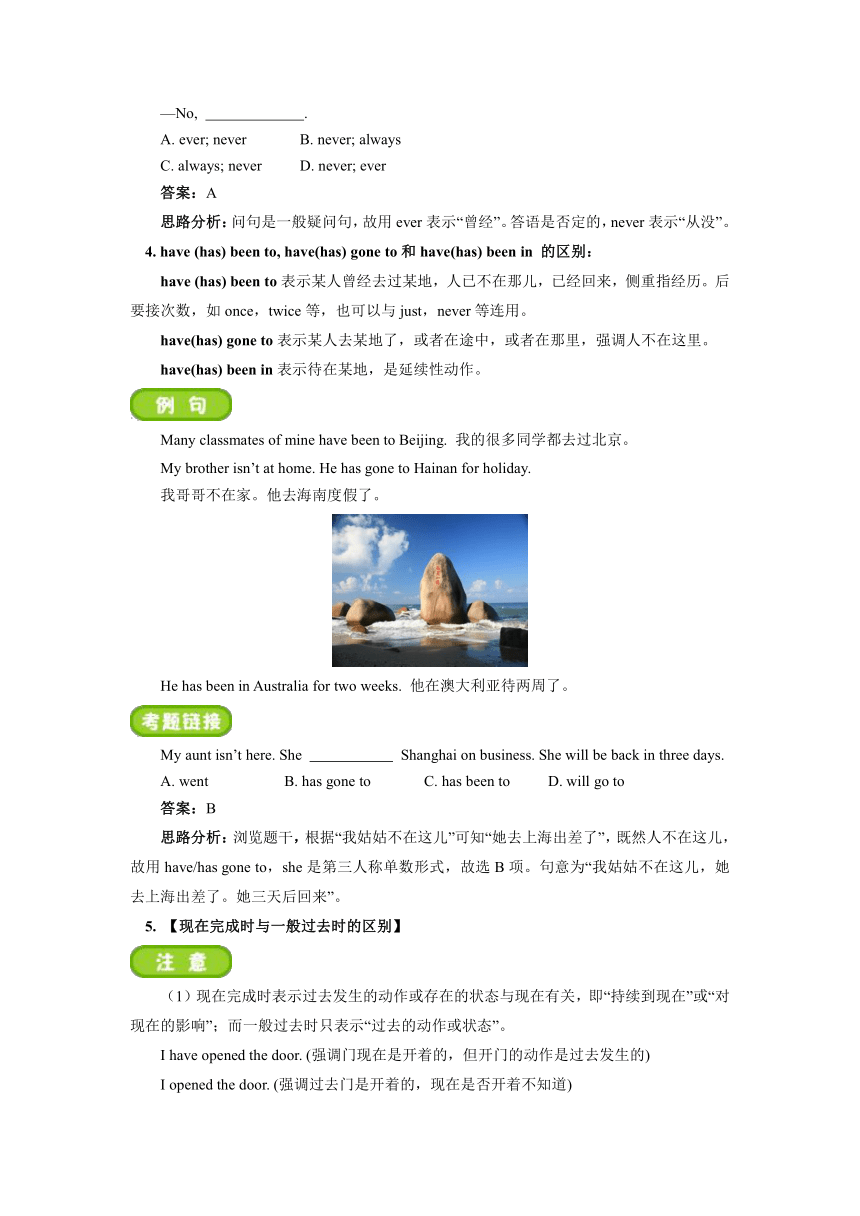人教新目标八年级英语下册Unit8-9知识点归纳练习(共7页 含答案)
文档属性
| 名称 | 人教新目标八年级英语下册Unit8-9知识点归纳练习(共7页 含答案) |  | |
| 格式 | doc | ||
| 文件大小 | 489.0KB | ||
| 资源类型 | 教案 | ||
| 版本资源 | 人教新目标(Go for it)版 | ||
| 科目 | 英语 | ||
| 更新时间 | 2021-05-29 20:02:24 | ||
图片预览




文档简介
人教新目标八年级英语下册Unit8-9知识点归纳练习
掌握Units 8-9的语法内容。
重点:
现在完成时
1. 现在完成时的用法(一)
2. 现在完成时的构成及句式
3. 现在完成时需注意的几点
4. 现在完成时和一般过去时的区别
难点:
现在完成时的运用
1. 现在完成时在中考中是考查的重点和要点,主要分布在单项选择、完形填空、单词运用以及动词应用等题型中。
2. 分值基本上占2-3分。在学习中,要特别注意。
1. 现在完成时
Have you read Little Women yet? 你读过《小妇人》吗?
Have you ever been to the space museum? 你曾去过太空博物馆吗?
现在完成时有两个用法。本讲介绍第一种用法。
用法一:现在完成时表示过去发生或已经完成的动作对现在造成的影响或结果。常用标志词有:already, yet, ever, never, just, before, twice, in the past / last few years, so far等。
They have done their homework already. 他们已经做了作业。
Our hometown has changed a lot in the past five years.
我们的家乡在过去的五年间变化了很多。
In the past few years, there ____________ great changes in my hometown.
A. have been B. were C. had been D. are
答案:A
思路分析:根据时间状语 in the past few years “在过去的几年间”,可知用现在完成时,故选A项。句意为“在过去的几年间,我的家乡发生了巨大的变化”。
2. 现在完成时的构成
现在完成时由“助动词have(has)+过去分词”构成。
过去分词的构成:
规则变化(同过去式):
(1)大多数动词直接在后面加-ed,如:work→ worked
(2)以不发音的e结尾的动词需加-d,如:live→ lived
(3)以“辅音字母+y”结尾的动词需将y改为i,再加-ed,如:study→ studied
(4)以重读闭音节结尾且末尾只有一个辅音字母,应双写末尾的辅音字母,再加-ed,如:stop → stopped
不规则变化:
少数动词属于不规则动词,其过去分词形式需要一一记忆。
drink → drunk,find → found,leave → left,
see → seen,tell → told,read → read等。
【句式】
肯定句:主语+have/ has +过去分词+其他。
否定句:主语+have/ has + not +过去分词+其他。
一般疑问句:Have/ Has +主语+过去分词+其他?
简略肯定回答:Yes, 主语+have/ has.
简略否定回答:No, 主语+have/ has not.
特殊疑问句:特殊疑问词+have/ has +主语+过去分词+其他?
His brother has seen that film. 他的弟弟已看了那部电影。
His brother hasn’t seen that film. 他的弟弟还没看那部电影。
—Has his brother seen that film? 他弟弟看那部电影了吗?
—Yes, he has. / No, he hasn’t. 是的,他看了。/ 不,他没看。
What has his brother seen? 他弟弟看过什么?
3. 现在完成时需要注意的几点
(1)句式变换时要注意:
肯定句中常用already,可放在句中,也可放在句末。否定句和疑问句中常用yet,放在句末。
I’ve already posted the photos. 我已经寄了那些照片。
I haven’t watered the plants yet. 我还没有浇这些植物。
—Has he found his watch yet? 他找到他的手表了吗?
—Yes, he has. / No, he hasn’t. 是的,找到了。/ 不,还没找到。
(2)ever意为“曾经;在任何时候”,用于否定句、疑问句或条件状语从句中。never表示“未曾;从来不”,本身具有否定意义。
Have you ever helped people you don’t know? 你曾经帮助过你不认识的人吗?
I’ve never visited the USA. 我从未去过美国。
1. They reading the book.
A. haven’t finish B. not have finished
C. haven’t finished D. finished not have
答案:C
思路分析:浏览各选项可知时态是现在完成时,其否定句是在助动词have/ has后加not;故选C项。句意为“他们还没有读完那本书”。
2. —I’ve finished my homework. Have you finished yours ?
—No, not .
A. already; already; yet B. yet; already; yet
C. already; yet; yet D. already; yet; already
答案:C
思路分析:浏览题干可知第一空所在的句子是肯定句,故用already;第二句是疑问句,答语是否定句,都用yet。句意为“——我已经完成了我的作业。你完成你的了吗?——没有,还没”。
3. —Have you been to Xiamen?
—No, .
A. ever; never B. never; always
C. always; never D. never; ever
答案:A
思路分析:问句是一般疑问句,故用ever表示“曾经”。答语是否定的,never表示“从没”。
4. have (has) been to, have(has) gone to和have(has) been in 的区别:
have (has) been to表示某人曾经去过某地,人已不在那儿,已经回来,侧重指经历。后要接次数,如once,twice等,也可以与just,never等连用。
have(has) gone to表示某人去某地了,或者在途中,或者在那里,强调人不在这里。
have(has) been in表示待在某地,是延续性动作。
Many classmates of mine have been to Beijing. 我的很多同学都去过北京。
My brother isn’t at home. He has gone to Hainan for holiday.
我哥哥不在家。他去海南度假了。
He has been in Australia for two weeks. 他在澳大利亚待两周了。
My aunt isn’t here. She Shanghai on business. She will be back in three days.
A. went B. has gone to C. has been to D. will go to
答案:B
思路分析:浏览题干,根据“我姑姑不在这儿”可知“她去上海出差了”,既然人不在这儿,故用have/has gone to,she是第三人称单数形式,故选B项。句意为“我姑姑不在这儿,她去上海出差了。她三天后回来”。
5. 【现在完成时与一般过去时的区别】
(1)现在完成时表示过去发生的动作或存在的状态与现在有关,即“持续到现在”或“对现在的影响”;而一般过去时只表示“过去的动作或状态”。
I have opened the door. (强调门现在是开着的,但开门的动作是过去发生的)
I opened the door. (强调过去门是开着的,现在是否开着不知道)
(2)有时同一个动作的不同时态可以表达不同的含义。
He has been in the army for two years. (还在部队)
He was in the army for two years. (现已离开部队)
—I the book to the library.
—When you it?
A. have returned; did; return B. have returned; have; returned
C. had returned; did; return D. returned; have; returned
答案:A
思路分析:浏览题干可知句意为“——我已把书归还给图书馆了。——你什么时候还的?”上句表示的是过去发生的动作对现在造成的结果,故用现在完成时;答语是询问“还”的动作的,故用一般过去时。
1. Julia isn’t going to the cinema with us because she the film.
A. sees B. saw C. will see D. has seen
2. The famous writer one new book in the past two years.
A. is writing B. was writing C. wrote D. has written
3. — Our country a lot so far.
—Yes, I hope it will be even .
A. has changed; well B. changed; good
C. has changed; better D. changed; better
4. —These farmers have been to the United States.
—Really? When there?
A. will they go B. did they go
C. do they go D. have they gone
5. Miss Green isn’t in the office. She to the library.
A. has gone B. went C. will go D. has been
答案:DDCBA
思路分析:
1. 表示过去发生的动作对现在造成的结果,即:她已知道了电影的内容。故用现在完成时。句意为“茱莉亚不打算和我们一起去看电影,因为她已看了这部电影”。
2. 根据时间状语in the past two years可知用现在完成时,故选D项。
3. so far是现在完成时的标志词,故第一空用现在完成时;even意为“甚至”,后接比较级,故选C项。
4. when不能与现在完成时连用,故排除D项;根据上句句意“这些农民已去过美国”可知应选B项,下句意为“他们什么时候去的”。
5. 根据前句句意“格林小姐不在办公室”可知“她已去图书馆了”,可能在图书馆,也可能在去图书馆的路上,故选A项。
八下Unit 10 I’ve had this bike for three years.
1. 写出下列单词的意思
certain_______; truthful________; search________; among________;
regard________; opposite________; consider ________
2. 写出下列短语的含义
check out________; no longer_________; to be honest_________;
according to________; in one’s opinion _________
3. 翻译下列句子
1) — How long have you had that bike over there?
— I’d had it for three years!
________________________________________
2) Children have learned to read and count at my old primary school since the mid-20th century.
_______________________________________________
思考问题一:certain有什么用法? 与sure有什么异同?
思考问题二:no longer 和no more有什么区别?
思考问题三:现在完成时态中,for, since后各接什么时间?
(答题时间:30分钟)
Ⅰ. 用括号内所给动词的适当形式填空
1. Both of them (come) to Hong Kong ten days ago.
2. Mary (lose) her pen. you (see) it here and there?
3. you (find) your watch yet?
4. —Are you thirsty?
—No. I just (have) some orange.
5. We already (return) the book.
6. they (build) a new school in the village?
7. I (not finish) my homework . Can you help me?
8. My father (read) the novel twice.
9. I (buy) a book just now.
10. I (lose ) my watch yesterday.
Ⅱ. 用have / has been to / in, have gone to及go的各种形式填空
1. —Where is Jack?
—He his country.
2. David the park just now.
3. — you ever America?
— Yes, I there many times.
4. —Where is Jim?
—He the farm.
5. —When he ?
—He an hour ago.
6. —Would you like to to the zoo with me?
—Yes, but I there before.
7. —Where you now?
— I to the zoo.
8. He often swimming.
9. you there last year?
10. they often skating in winter?
Ⅲ. 句型转换
1. Tina has already read Treasure Island. (改为否定句)
Tina Treasure Island yet.
2. His uncle has posted the photos to him already. (改为一般疑问句)
his uncle the photos to him ?
3.— Have you finished your homework yet? (作否定回答)
— , I .
4. Julia hasn’t got home from school yet. (改为肯定句)
Julia home from school.
5. Your uncle has been to New York twice. (对画线部分提问)
your uncle twice?
Ⅳ. 根据所给汉语意思完成句子
1. 李明已经爬过黄山了。
Li Ming Mount Huang.
2. 他爸爸刚刚吃过午饭。
His father lunch.
3. 比尔已从美国回来了吗?
Bill back from America ?
4. 迄今为止,我的家乡已发生了很大变化。
So far, great changes in my hometown.
5. 他从没有向他人借过钱。
He money from others.
6. 我刚刚丢了我的化学书。
I my chemistry book.
7. 我以前从来没去过那个农场。
I have that farm .
8. 他曾经发了封电子邮件。
He has an .
9. 你已经看过这部电影了吗?
you this film ?
10. 我哥哥还没回来。
My brother .
Ⅰ. 1. came 2. has lost; Have; seen 3. Have; found 4. have; had 5. have; returned
6. Have; built 7. haven’t finished 8. has read 9. bought 10. lost
Ⅱ. 1. has gone to 2. went to 3. Have; been to; have been 4. has gone to 5. did; go; went
6. go; have been 7. are; going; am going 8. goes 9. Did; go 10. Do; go
Ⅲ. 1. hasn’t read 2. Has; posted; yet 3. No; haven’t 4. has already got
5. Where has; been
Ⅳ. 1. has already climbed 2. has just had 3. Has; come; yet 4. have taken place
5. has never borrowed 6. have just lost 7. never been to; before 8. ever sent; e-mail
9. Have; seen; yet 10. hasn’t come back yet
掌握Units 8-9的语法内容。
重点:
现在完成时
1. 现在完成时的用法(一)
2. 现在完成时的构成及句式
3. 现在完成时需注意的几点
4. 现在完成时和一般过去时的区别
难点:
现在完成时的运用
1. 现在完成时在中考中是考查的重点和要点,主要分布在单项选择、完形填空、单词运用以及动词应用等题型中。
2. 分值基本上占2-3分。在学习中,要特别注意。
1. 现在完成时
Have you read Little Women yet? 你读过《小妇人》吗?
Have you ever been to the space museum? 你曾去过太空博物馆吗?
现在完成时有两个用法。本讲介绍第一种用法。
用法一:现在完成时表示过去发生或已经完成的动作对现在造成的影响或结果。常用标志词有:already, yet, ever, never, just, before, twice, in the past / last few years, so far等。
They have done their homework already. 他们已经做了作业。
Our hometown has changed a lot in the past five years.
我们的家乡在过去的五年间变化了很多。
In the past few years, there ____________ great changes in my hometown.
A. have been B. were C. had been D. are
答案:A
思路分析:根据时间状语 in the past few years “在过去的几年间”,可知用现在完成时,故选A项。句意为“在过去的几年间,我的家乡发生了巨大的变化”。
2. 现在完成时的构成
现在完成时由“助动词have(has)+过去分词”构成。
过去分词的构成:
规则变化(同过去式):
(1)大多数动词直接在后面加-ed,如:work→ worked
(2)以不发音的e结尾的动词需加-d,如:live→ lived
(3)以“辅音字母+y”结尾的动词需将y改为i,再加-ed,如:study→ studied
(4)以重读闭音节结尾且末尾只有一个辅音字母,应双写末尾的辅音字母,再加-ed,如:stop → stopped
不规则变化:
少数动词属于不规则动词,其过去分词形式需要一一记忆。
drink → drunk,find → found,leave → left,
see → seen,tell → told,read → read等。
【句式】
肯定句:主语+have/ has +过去分词+其他。
否定句:主语+have/ has + not +过去分词+其他。
一般疑问句:Have/ Has +主语+过去分词+其他?
简略肯定回答:Yes, 主语+have/ has.
简略否定回答:No, 主语+have/ has not.
特殊疑问句:特殊疑问词+have/ has +主语+过去分词+其他?
His brother has seen that film. 他的弟弟已看了那部电影。
His brother hasn’t seen that film. 他的弟弟还没看那部电影。
—Has his brother seen that film? 他弟弟看那部电影了吗?
—Yes, he has. / No, he hasn’t. 是的,他看了。/ 不,他没看。
What has his brother seen? 他弟弟看过什么?
3. 现在完成时需要注意的几点
(1)句式变换时要注意:
肯定句中常用already,可放在句中,也可放在句末。否定句和疑问句中常用yet,放在句末。
I’ve already posted the photos. 我已经寄了那些照片。
I haven’t watered the plants yet. 我还没有浇这些植物。
—Has he found his watch yet? 他找到他的手表了吗?
—Yes, he has. / No, he hasn’t. 是的,找到了。/ 不,还没找到。
(2)ever意为“曾经;在任何时候”,用于否定句、疑问句或条件状语从句中。never表示“未曾;从来不”,本身具有否定意义。
Have you ever helped people you don’t know? 你曾经帮助过你不认识的人吗?
I’ve never visited the USA. 我从未去过美国。
1. They reading the book.
A. haven’t finish B. not have finished
C. haven’t finished D. finished not have
答案:C
思路分析:浏览各选项可知时态是现在完成时,其否定句是在助动词have/ has后加not;故选C项。句意为“他们还没有读完那本书”。
2. —I’ve finished my homework. Have you finished yours ?
—No, not .
A. already; already; yet B. yet; already; yet
C. already; yet; yet D. already; yet; already
答案:C
思路分析:浏览题干可知第一空所在的句子是肯定句,故用already;第二句是疑问句,答语是否定句,都用yet。句意为“——我已经完成了我的作业。你完成你的了吗?——没有,还没”。
3. —Have you been to Xiamen?
—No, .
A. ever; never B. never; always
C. always; never D. never; ever
答案:A
思路分析:问句是一般疑问句,故用ever表示“曾经”。答语是否定的,never表示“从没”。
4. have (has) been to, have(has) gone to和have(has) been in 的区别:
have (has) been to表示某人曾经去过某地,人已不在那儿,已经回来,侧重指经历。后要接次数,如once,twice等,也可以与just,never等连用。
have(has) gone to表示某人去某地了,或者在途中,或者在那里,强调人不在这里。
have(has) been in表示待在某地,是延续性动作。
Many classmates of mine have been to Beijing. 我的很多同学都去过北京。
My brother isn’t at home. He has gone to Hainan for holiday.
我哥哥不在家。他去海南度假了。
He has been in Australia for two weeks. 他在澳大利亚待两周了。
My aunt isn’t here. She Shanghai on business. She will be back in three days.
A. went B. has gone to C. has been to D. will go to
答案:B
思路分析:浏览题干,根据“我姑姑不在这儿”可知“她去上海出差了”,既然人不在这儿,故用have/has gone to,she是第三人称单数形式,故选B项。句意为“我姑姑不在这儿,她去上海出差了。她三天后回来”。
5. 【现在完成时与一般过去时的区别】
(1)现在完成时表示过去发生的动作或存在的状态与现在有关,即“持续到现在”或“对现在的影响”;而一般过去时只表示“过去的动作或状态”。
I have opened the door. (强调门现在是开着的,但开门的动作是过去发生的)
I opened the door. (强调过去门是开着的,现在是否开着不知道)
(2)有时同一个动作的不同时态可以表达不同的含义。
He has been in the army for two years. (还在部队)
He was in the army for two years. (现已离开部队)
—I the book to the library.
—When you it?
A. have returned; did; return B. have returned; have; returned
C. had returned; did; return D. returned; have; returned
答案:A
思路分析:浏览题干可知句意为“——我已把书归还给图书馆了。——你什么时候还的?”上句表示的是过去发生的动作对现在造成的结果,故用现在完成时;答语是询问“还”的动作的,故用一般过去时。
1. Julia isn’t going to the cinema with us because she the film.
A. sees B. saw C. will see D. has seen
2. The famous writer one new book in the past two years.
A. is writing B. was writing C. wrote D. has written
3. — Our country a lot so far.
—Yes, I hope it will be even .
A. has changed; well B. changed; good
C. has changed; better D. changed; better
4. —These farmers have been to the United States.
—Really? When there?
A. will they go B. did they go
C. do they go D. have they gone
5. Miss Green isn’t in the office. She to the library.
A. has gone B. went C. will go D. has been
答案:DDCBA
思路分析:
1. 表示过去发生的动作对现在造成的结果,即:她已知道了电影的内容。故用现在完成时。句意为“茱莉亚不打算和我们一起去看电影,因为她已看了这部电影”。
2. 根据时间状语in the past two years可知用现在完成时,故选D项。
3. so far是现在完成时的标志词,故第一空用现在完成时;even意为“甚至”,后接比较级,故选C项。
4. when不能与现在完成时连用,故排除D项;根据上句句意“这些农民已去过美国”可知应选B项,下句意为“他们什么时候去的”。
5. 根据前句句意“格林小姐不在办公室”可知“她已去图书馆了”,可能在图书馆,也可能在去图书馆的路上,故选A项。
八下Unit 10 I’ve had this bike for three years.
1. 写出下列单词的意思
certain_______; truthful________; search________; among________;
regard________; opposite________; consider ________
2. 写出下列短语的含义
check out________; no longer_________; to be honest_________;
according to________; in one’s opinion _________
3. 翻译下列句子
1) — How long have you had that bike over there?
— I’d had it for three years!
________________________________________
2) Children have learned to read and count at my old primary school since the mid-20th century.
_______________________________________________
思考问题一:certain有什么用法? 与sure有什么异同?
思考问题二:no longer 和no more有什么区别?
思考问题三:现在完成时态中,for, since后各接什么时间?
(答题时间:30分钟)
Ⅰ. 用括号内所给动词的适当形式填空
1. Both of them (come) to Hong Kong ten days ago.
2. Mary (lose) her pen. you (see) it here and there?
3. you (find) your watch yet?
4. —Are you thirsty?
—No. I just (have) some orange.
5. We already (return) the book.
6. they (build) a new school in the village?
7. I (not finish) my homework . Can you help me?
8. My father (read) the novel twice.
9. I (buy) a book just now.
10. I (lose ) my watch yesterday.
Ⅱ. 用have / has been to / in, have gone to及go的各种形式填空
1. —Where is Jack?
—He his country.
2. David the park just now.
3. — you ever America?
— Yes, I there many times.
4. —Where is Jim?
—He the farm.
5. —When he ?
—He an hour ago.
6. —Would you like to to the zoo with me?
—Yes, but I there before.
7. —Where you now?
— I to the zoo.
8. He often swimming.
9. you there last year?
10. they often skating in winter?
Ⅲ. 句型转换
1. Tina has already read Treasure Island. (改为否定句)
Tina Treasure Island yet.
2. His uncle has posted the photos to him already. (改为一般疑问句)
his uncle the photos to him ?
3.— Have you finished your homework yet? (作否定回答)
— , I .
4. Julia hasn’t got home from school yet. (改为肯定句)
Julia home from school.
5. Your uncle has been to New York twice. (对画线部分提问)
your uncle twice?
Ⅳ. 根据所给汉语意思完成句子
1. 李明已经爬过黄山了。
Li Ming Mount Huang.
2. 他爸爸刚刚吃过午饭。
His father lunch.
3. 比尔已从美国回来了吗?
Bill back from America ?
4. 迄今为止,我的家乡已发生了很大变化。
So far, great changes in my hometown.
5. 他从没有向他人借过钱。
He money from others.
6. 我刚刚丢了我的化学书。
I my chemistry book.
7. 我以前从来没去过那个农场。
I have that farm .
8. 他曾经发了封电子邮件。
He has an .
9. 你已经看过这部电影了吗?
you this film ?
10. 我哥哥还没回来。
My brother .
Ⅰ. 1. came 2. has lost; Have; seen 3. Have; found 4. have; had 5. have; returned
6. Have; built 7. haven’t finished 8. has read 9. bought 10. lost
Ⅱ. 1. has gone to 2. went to 3. Have; been to; have been 4. has gone to 5. did; go; went
6. go; have been 7. are; going; am going 8. goes 9. Did; go 10. Do; go
Ⅲ. 1. hasn’t read 2. Has; posted; yet 3. No; haven’t 4. has already got
5. Where has; been
Ⅳ. 1. has already climbed 2. has just had 3. Has; come; yet 4. have taken place
5. has never borrowed 6. have just lost 7. never been to; before 8. ever sent; e-mail
9. Have; seen; yet 10. hasn’t come back yet
同课章节目录
- Unit 1 What's the matter?
- Section A
- Section B
- Unit 2 I'll help to clean up the city parks.
- Section A
- Section B
- Unit 3 Could you please clean your room?
- Section A
- Section B
- Unit 4 Why don't you talk to your parents?
- Section A
- Section B
- Unit 5 What were you doing when the rainstorm came
- Section A
- Section B
- Review of Units 1-5
- Unit 6 An old man tried to move the mountains.
- Section A
- Section B
- Unit 7 What's the highest mountain in the world?
- Section A
- Section B
- Unit 8 Have you read Treasure Island yet?
- Section A
- Section B
- Unit 9 Have you ever been to a museum?
- Section A
- Section B
- Unit 10 I've had this bike for three years.
- Section A
- Section B
